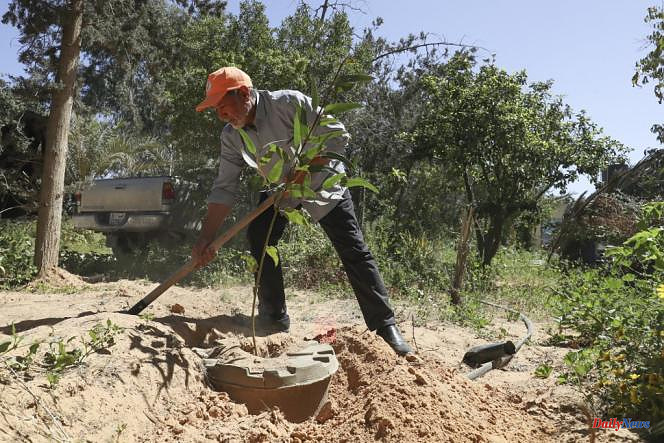Sitting in the shade of young eucalyptus and laurels, Khalifa Ramadan prepares with agronomist friends a volunteer mission to preserve the forest cover of western Libya, threatened with extinction by years of drought, deforestation and galloping urbanization.
Every week, the 50-year-old brings together around ten agronomists and horticulturists to launch awareness campaigns in the media or actions in the field. He wants to face "the dangers that threaten Tripoli and the coastal cities in particular, where the hand of man and natural factors have overcome the forests" and much of the vegetation, he explains to the AFP.
With 40 years of experience in agriculture and market gardening in Libya, he founded the association Les amis de l'arbre to seek, with dozens of other volunteers, solutions to this scourge which threatens the forest population of the coast. Western Libyan.
At his farm in Tajoura, on the eastern outskirts of Tripoli, his group is preparing seedlings he has grown in his own greenhouses for planting in "areas where the slashing, urban encroachment and drought of recent years destroyed everything", saddens the agricultural engineer, yellow cap on his head.
A sandy and dusty landscape
Thanks to the oil windfall, Libya had launched in the 1950s and 1960s a vast campaign to plant forests and clean up land dedicated to agriculture, particularly around Tripoli, accompanied by a strict regulation of urban expansion and of a fight against erosion and the advance of the desert.
Despite low rainfall and an absence of permanent waterways, Libya is characterized by diverse natural vegetation. But this green belt that runs along the Mediterranean coast and covered 200 kilometers between Tripoli and Misrata, further east, has almost disappeared. Today, it has given way to a sandy and dusty landscape.
The institutional and security chaos since the fall of Muammar Gaddafi's regime in 2011 has weakened state regulatory bodies and relegated environmental protection to the background. The "green belt has been the target of numerous violations in recent years", General Faouzi Aboughalia, spokesman for the agricultural police, told AFP, who reported "1,700 criminal cases".
In Garaboulli (50 km east of Tripoli), an area known for its superb white sand beaches and its dense vegetation of hundred-year-old eucalyptus, acacia and wild mimosa trees, cut trunks litter the ground near the ruins of huts demolished by court order.
Drought, another serious threat
“With the help of other security services, we have put a stop to these criminal acts. Security cells have been set up to recover the usurped land", underlines General Aboughalia, welcoming this "success which has made it possible to recover more than 8,000 hectares for the benefit of the Ministry of Agriculture".
He points out that his men are trying to prevent "certain sick spirits from cutting down trees and making coal" or from "illegally" appropriating land and building "houses or resorts" on it. Endowed with "modest means compared to the magnitude of the task", the soldier says he is aware of the challenges to be met.
For Abderrahmane Mohamad, another 65-year-old volunteer, in addition to deforestation, drought poses another serious threat to Libya with a "drop in groundwater levels around Tripoli in particular". “A few decades ago, drinking water appeared at 40 or 60 meters deep. Now, you have to dig to a depth of between 100 and 160 meters, ”explains Mr. Mohamad, also referring to the contamination of certain wells by salt water.
Rising temperatures and falling rainfall from 500 to just 300 mm/year, according to official data, have been accentuated by the uncontrolled cutting of trees and shrubs. For Khalifa Ramadan, if the protection of the vegetation cover by controls is essential, the awareness of the general public is even more so. "We must inculcate the culture of preserving trees and encourage people to plant to stabilize the soil, temper the climate, clean the air and attract the rains", abounds the agronomist.












